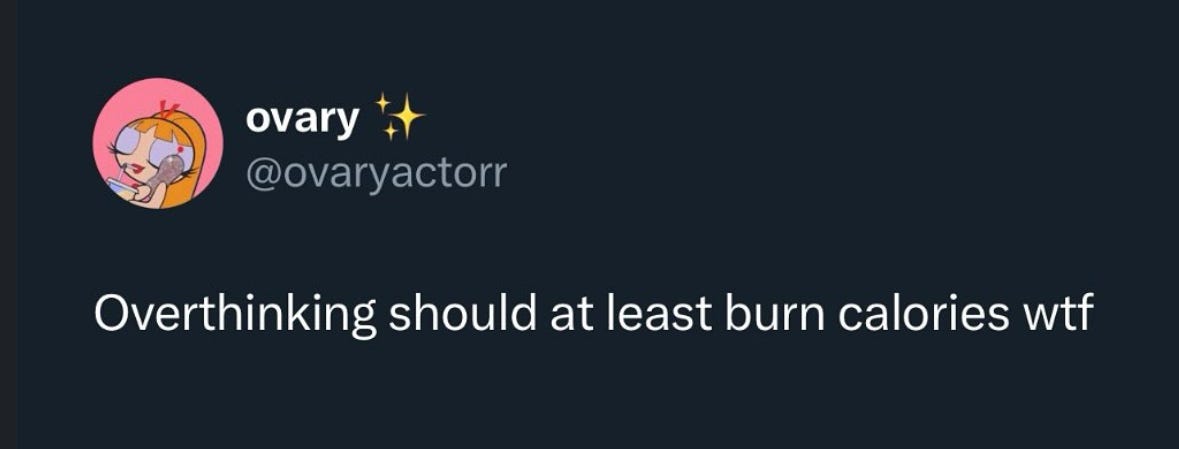The Currency of Overthinking
An inquiry into why we think, feel, triple-text and unsend in silence...
What if we renamed anxiety as ‘creative intelligence with a trust issue’?
I’ve been thinking about that line for three days now. Okay, twelve. Fine, maybe it’s been living rent-free in my head for a month.
Writing is primarily thinking. And probably that's why I don’t like the term overthinking.
It is an elusive, slippery word that pops up in Instagram therapy memes and first dates like it’s a curse. Who decided what counts as too much to add a prefix like “over”?
At the Bangalore Poetry Fest 2025, I heard Swanand Kirkire speak. In an old conversation, Kavish Seth had said something similar. Both of them circled the same question like a campfire story: “What does overthinking even mean? Who decided there’s a ceiling on thought?”
I still don’t have a good answer.
In the right hands, overthinking is depth. It’s the kind of internal layering that allows artists to conjure metaphors, lovers to notice silences, and mothers to remember which friend hates coriander.
[By the way, I have never met anyone who underthinks… Have you?]
My grandparents worried out loud. My parents share 8923 perspectives and probabilities in three languages. I do it with Google Docs and good lighting. The medium has changed. The mind loops stay the same.
But somewhere along the way, this word was hijacked, stripped of nuance, memeified, and used as shorthand for a flaw. The girl who double-texts. The boy who doesn’t sleep. The person who keeps forty tabs open for every decision.
Makes me wonder if overthinking is kind of a modern trauma response?
Late capitalism has quietly turned every brain into a venture capital meeting.
Every choice is risk-assessed, ROI-measured, and mentally costed before execution. “Should I call him/her?” becomes a full-scale pitch deck: audience, impact, possible rejection curve, emotional burn rate. We’re modelling futures in Excel, quite literally. And like most VCs, we’re terrified of backing the wrong outcome.
Living in Bangalore and working alongside VCs made me draw this analogy.
In India, 81% of people say they overthink for more than three hours a day, and 25% say it’s constant, even about small things like what to cook, say, or post.
Clearly, that’s decision fatigue.
We’ve layered even the simplest decisions with the burden of potential outcomes, imagined judgments, and yes… preemptive regret.
We are suffering from what psychologists call choice overload: when abundance leads to inaction. The paradox of modern life: too many options lead us to pick none.
We become browsers in our own lives…
Here’s another number for you: the average person makes 35,000 decisions a day. Yes. You decide what time to wake up, how long to snooze, whether that outfit is too try-hard, and what to caption your breakfast. Micro-decisions. Micro-stressors. Macro implosion. Hah!
Meanwhile, Jeff Bezos famously said he tries to make only three good decisions a day and preferably before lunch. That’s it. He delegates the trivial, protects his bandwidth, and treats decision-making like a scarce resource because it is.
What happens when you’re already tired before the actual big decision?
You default. Then you probably spiral. And in the end, you avoid.
Let me be clear: overthinking isn’t the enemy. Spiralling is. There’s a difference. Overthinking is staying with a thought long enough to see all its possible sides. Spiralling is getting stuck in its echo. One can birth art. The other begets paralysis.
Let’s follow the money: Spiralling leads to anxiety. Anxiety leads to therapy. Therapy becomes the balm. But also, the bill. Mental health is a trillion-dollar industry now. We pay to think better. We pay not to think. Or drink. Either way, we’re paying.
We’re a part of the supply chain. Our restlessness is a revenue stream.
It’s time we find better words/terms. Instead of “overthinking,” say “prolific cogitation” when it’s functional. When it’s dysfunctional, call it “analysis paralysis.” When it’s anxious, call it “cognitive spiralling.” When it’s your mother, maybe just call it love. 🙂
So what’s the way out? Limit your inputs?
We know well that not everything deserves your bandwidth. Use timeboxing. Give yourself a deadline. It has always worked for me.
Artists need discipline beyond inspiration. Journal your spirals and make them visible. You can’t edit what’s not on the page. Stop watching Instagram therapists call your flaws as gifts.
Think better. Truer. With less fear and more art.
When we shame overthinking, we silence the people who’ve built worlds in their heads, loved too deeply, remembered too precisely, and imagined futures that haven’t even been priced yet.
You see, no amount of mental rehearsals can outwit grief. Or joy. Or the accident of timing. Life, despite our emotional spreadsheets, is still beautifully unscripted.
In my honest opinion, overthinking is merely a verb in a world that sold us speed over sense. It’s the quiet rebellion of those still paying close attention. Here’s to living in sentences - yours, mine and ours!
Writeously yours,






Thank you, Shalaka, for writing on this topic! Overthinking is like a cursed word. I can totally relate to what you said.
- A gigantically overthinker(?)